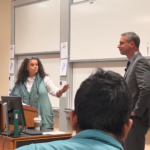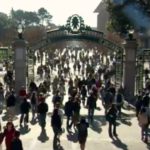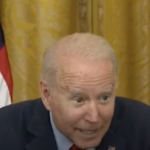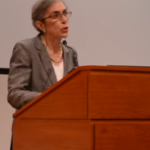Anti-Semitism on California Campuses
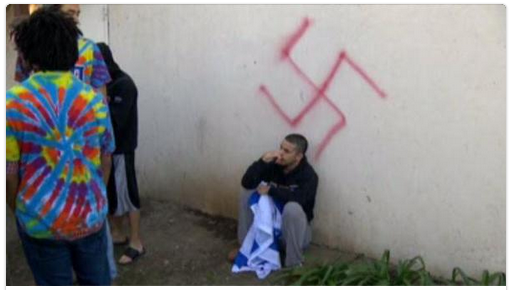
Editor’s Note: This post originally appeared on the Gatestone Institute website.
The California university system seems to have the dubious distinction of being the epicenter of the campus war against Israel. The situation that has apparently reached such intolerable levels that the Board of Regents of the University of California (UC Regents) was forced to take some action. This effort resulted in a study entitled the “Final Report of the Regents Working Group on Principles Against Intolerance.” The study attempts to establish guidelines by which any discrimination against a minority group on campus would be identified and censured. The report, however, specifically focused on the thorny issue of anti-Israelism and anti-Semitism as a prevalent and ugly reality throughout the California university system.
The report examined a range of incidents that occurred during the 2014-15 academic year. It cited unfortunate transgressions that “included vandalism targeting property associated with Jewish people or Judaism; challenges to the candidacies of Jewish students seeking to assume representative positions within student government; political, intellectual and social dialogue that is anti-Semitic; and social exclusion and stereotyping.”
The problem on California campuses, and on campuses across the country, is apparently that pro-Palestinian activists, in their zeal to seek self-affirmation, statehood, and “social justice” for Palestinians, have waged — presumably as a tactic in achieving those ends — an extremely caustic cognitive war against Israel and Jews. That, however, appears to be just part of a larger, more invidious intellectual jihad against Israel led by some of those in the Muslim world together with some Western elites who also wish to weaken, and ultimately destroy, the Jewish state.
Being pro-Palestinian on campuses today, it turns out, does not necessarily mean that one is committed to helping the Palestinians be productive, live well, build a free and open nation or create a civil society with transparent government, a free press, human rights, and a representative government.
Being pro-Palestinian on campus today involves very little that actually benefits or makes more likely the birth of a new Palestinian state that will live side by side in peace with Israel. What being pro-Palestinian seems to have come to mean is continually denigrating and attacking Israel with a false historical narrative and the grotesquely misused language of human rights.
The moral uprightness that anti-Israel activists feel in denouncing what they perceive to be Israel’s supposedly “racist,” “apartheid” character, combined with its purportedly being an “illegal occupier of stolen Muslim land,” has manifested itself in ideological assaults against Zionism, Israel, and, by extension, Jews in general.
Of great concern to those who have observed the invidious byproduct of this radicalism, including the Regents Working Group, is the frequent appearance of what is claimed to be anti-Israel sentiment, which often rises to the level of raw anti-Semitism, when criticism of Israel bleeds into a darker, more sinister level of hatred. It is enough to make Jewish students, whether or not they care about Israel at all, uncomfortable, unsafe, or even hated on their own campuses.
A 2014 study commissioned by then-UC President Mark G. Yudof, to measure the climate faced by Jewish students, found that
“Jewish students are confronting significant and difficult climate issues as a result of activities on campus which focus specifically on Israel, its right to exist and its treatment of Palestinians. The anti-Zionism and Boycott, Divestment and Sanctions (BDS) movements and other manifestations of anti-Israel sentiment and activity create significant issues through themes and language which portray Israel and, many times, Jews in ways which project hostility, engender a feeling of isolation, and undermine Jewish students’ sense of belonging and engagement with outside communities.”
If anything, since that study was written, matters have gone from bad to worse. This latest report only affirmed Yudov’s earlier findings, and stated more specifically, that
“Anti-Semitism, anti-Zionism and other forms of discrimination have no place at the University of California. Most members of the University community agree with this conclusion and would agree further that the University should strive to create an equal learning environment for all students.”
The reference to anti-Zionism being henceforth prohibited as unacceptable speech or behavior received immediate and thunderous denunciation from, not surprisingly, those very groups and individuals who have been the worst perpetrators — groups such as Students for Justice in Palestine, the Muslim Student Association, Jewish Voice for Peace and other groups, students and faculty who supposedly support human rights. They have been joined in their outrage by supposedly “free speech advocates” and others who feel that guidelines proscribing speech about a topic that many see as merely political is contrary to the notion of academic free speech — not to mention unconstitutional in seeking to censor people’s speech at all.
However, the guidelines crafted by the Regents were not cobbled together for the purpose of criminalizing or suppressing free speech. One of the difficulties pro-Israel groups and activists have had in making the Regents see the necessity of a workable code for gauging what is, and what is not, anti-Semitism has been the difficulty university officials themselves have had in knowing when pro-Palestinian activism on their campuses has become something more in keeping with the elements of classic anti-Semitism. For that very reason, pro-Israel groups had encouraged the Regents to incorporate in their report the working definition of anti-Semitismused by the U.S. Department of State, which defines anti-Semitism existing as
“Using the symbols and images associated with classic anti-Semitism to characterize Israel or Israelis; drawing comparisons of contemporary Israeli policy to that of the Nazis; blaming Israel for all inter-religious or political tensions; … applying double standards by requiring of it a behavior not expected or demanded of any other democratic nation; … denying the Jewish people their right to self-determination, and denying Israel the right to exist…”
These are exactly the type of attitudes and accusations expressed regularly on California campuses.
If the UC system adopts the use of the State Department’s working definition of anti-Semitism, and incorporates it into the “principles against intolerance,” does that mean, as critics of the principles have suggested, that the free speech of pro-Palestinian activists will be suppressed, censored, or punished? Not even slightly.
Pro-Palestinian students and faculty can continue to sponsor virulent “Israel Apartheid Week” events, promote annual divestment and boycott resolutions against Israel, construct mock “apartheid walls,” hang blood-strewn Israeli flags, accuse Israel supporters of being racist and genocidal, give tacit support to the murder of Jews by being apologists for Palestinian terror, and continue to chant “Long live Intifada.” They can continue supporting murderous Arab campaigns against Israeli civilians, and chanting, “Palestine will be free, from the River to the Sea” — meaning that a new Palestinian state should displace Israel, not exist in peace beside it. They will still enjoy their constitutionally-protected right to speak freely and in whatever manner they choose, even if that speech is corrosive, factually defective, hate-filled, biased, historically-inaccurate, defamatory, and what is usually defined as “hate speech.”
The existence of the “principles against intolerance” and the working definition of anti-Semitism will not prevent anyone from spewing forth whatever intellectual sewage he or she chooses. But, importantly, administrators will finally have the ability to identify instances when pro-Palestinian activism crosses the line into anti-Semitism. They can then publicly and immediately condemn that speech when it occurs, just as they regularly — and appropriately — do if a hangman’s noose is found on campus, or slurs are made against gay students, or if students wear little sombreros at a tequila-fueled off-campus party, or if, in those rare instances, Muslim students are characterized as supporters of terror.
University administrators have been reluctant to identify and condemn anti-Semitic behavior and speech when it occurs. Armed with the State Department’s working definition and the other language in the “principles against intolerance,” school officials will, without moral or ethical qualms, be able to stand up against intolerance when directed at Jewish students and other pro-Israel members of the campus community, as in the past they have been unwilling or unable to do.
Pro-Palestinian activists have been trying to elevate the Palestinian cause by degrading Israel and its supporters with virulent language, slanders, blood libels, and racist inversions of history and fact. As former Harvard president Lawrence Summers put it, they have unleashed forms of expression that are “anti-Semitic in their effect, if not their intent.”
That is the issue here, and why it is both necessary and important that, in the effort to help Palestinians achieve statehood and promote their cause, another group — Jewish students and pro-Israel individuals on American campuses — do not themselves become victims in a struggle for another group’s self-determination. This is a situation that leaders on campuses, at least, can now prevent from taking place.
Richard L. Cravatts, PhD, is author of Genocidal Liberalism: The University’s Jihad Against Israel & Jews, and president of Scholars for Peace in the Middle East.

